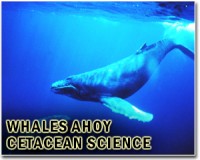| . |  |
. |
Brisbane, Australia (UPI) Apr 14, 2011 Male humpback whales in a population all sing the same mating tune, but the song changes and the new version spreads across oceans, Australian researchers say. "Our findings reveal cultural change on a vast scale," Ellen Garland, a graduate student at The University of Queensland, said. Multiple songs moved like "cultural ripples from one population to another, causing all males to change their song to a new version," she said. The study, published in the journal Current Biology, is the first documentation of such a broad-scale and population-wide cultural exchange in any species other than humans, Garland said. Researchers made the discovery by analyzing patterns in whale songs recorded from six neighboring populations in the Pacific Ocean over ten years. "The songs started in the population that migrates along the eastern coast of Australia and then moved -- just the songs, and probably not the whales -- all the way to French Polynesia in the east," Garland said. "Songs were first learnt from males in the west and then subsequently learned in a stepwise fashion repeatedly across the vast region," she said. The researchers say they suspect whales in nearby populations hear the new songs while they swim together on migration.
Share This Article With Planet Earth
Related Links Follow the Whaling Debate
 More protection given Puget Sound orcas
More protection given Puget Sound orcasSeattle (UPI) Apr 9, 2011 Recreational boaters and whale-watching vessels must now stay at least 300 feet from orcas in Puget Sound in Washington state, officials said. The National Marine Fisheries Service issued new regulations Friday aimed at protecting the remaining population of orcas, also known as killer whales, in the sound, The Seattle Times reported. The rules double the no-go distance around the orcas ... read more |
|
| The content herein, unless otherwise known to be public domain, are Copyright 1995-2010 - SpaceDaily. AFP and UPI Wire Stories are copyright Agence France-Presse and United Press International. ESA Portal Reports are copyright European Space Agency. All NASA sourced material is public domain. Additional copyrights may apply in whole or part to other bona fide parties. Advertising does not imply endorsement,agreement or approval of any opinions, statements or information provided by SpaceDaily on any Web page published or hosted by SpaceDaily. Privacy Statement |